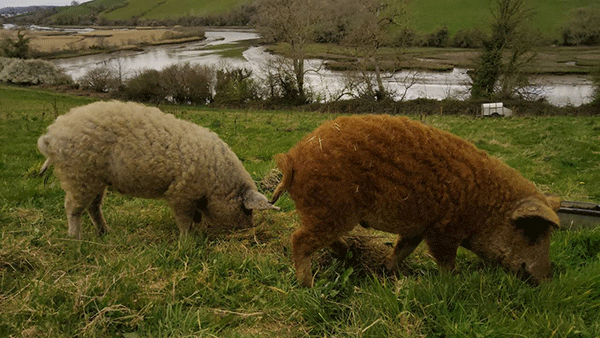Two woolly pigs are helping a rewilding project in Devon due to their natural ability to accelerate the regeneration of wildlife.
A pair of Hungarian Mangalitsa pigs, famed for their distinctive coat of curly hair have been welcomed to rewilding project on the Sharpham Estate in South Devon.
The closest breed to the ancient wild boar, the pair have been selected for their natural tendencies to uproot the ground and soil. This cultivating process makes a welcoming ‘seed bed’ for plants trying to germinate and plant species are able spread more rapidly.
Jack Skuse from Ambios, the conservation specialists supporting the project, said: “We’re hoping that they’ll break the turf and open up a bit of bare ground in different places. In that bare ground will be where we see responses.
“We’ll see pioneering plants and hopefully species buried in the seed bank that we haven’t seen before. It will start to change the structure of the grass. It’s in that structural diversity is where we’ll see real wildlife responses.”
The woolly duo will add their weight to the rewilding project for a few weeks, before returning to their owner who rents them out to turn over and regenerate people’s land.
“We want that disturbance at a certain level, we don’t want pigs in there all the time and making a big mud bath, we want it at intermittent levels,” said Skuse.

Popularised by bestselling book Wilding by Isabella Tree, the concept of rewilding is to give space back to nature with as little human intervention as possible. It’s increasingly being seen as an antidote to the biodiversity crisis and sixth mass species extinction.
Having recently celebrated their first anniversary of the rewilding venture, the Sharpham Estate have reported promising returns of wildlife to the 50-acre area in South Devon given back to nature.
Simon Roper from Ambios said: “Year one has been absolutely amazing. We’ve seen recolonisation from the adjacent land, crickets and bird species appearing in greater numbers.”
Left without intervention, the land has diversified and created habitats for small mammals like mice and voles and creating breeding spots for insects.
“The next phase is to create an environment where even more species can return,” said Roper.
This includes the addition of cows and ponies that will complement the pigs’ efforts and will start to recreate different biodiverse habitats.
“We will introduce a small number of cows to graze and control succession and to stimulate vegetation dynamics. When we introduce browsing animals like ponies that nibble on the woody vegetation, that’ll create a different mosaic of growth and succession,” explained Skuse.
“It’s about balance between grazers, the browsers, and the rooters, and that will start to mimic what we would have seen in the landscape a long time ago.”















0 Comments